|
TRANSLATE THIS ARTICLE
Integral World: Exploring Theories of Everything
An independent forum for a critical discussion of the integral philosophy of Ken Wilber
  Frank Visser, graduated as a psychologist of culture and religion, founded IntegralWorld in 1997. He worked as production manager for various publishing houses and as service manager for various internet companies and lives in Amsterdam. Books: Ken Wilber: Thought as Passion (SUNY, 2003), and The Corona Conspiracy: Combatting Disinformation about the Coronavirus (Kindle, 2020). Frank Visser, graduated as a psychologist of culture and religion, founded IntegralWorld in 1997. He worked as production manager for various publishing houses and as service manager for various internet companies and lives in Amsterdam. Books: Ken Wilber: Thought as Passion (SUNY, 2003), and The Corona Conspiracy: Combatting Disinformation about the Coronavirus (Kindle, 2020). SEE MORE ESSAYS WRITTEN BY FRANK VISSER A Brief History
|
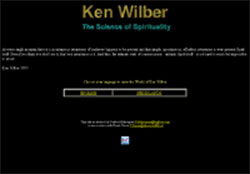
|
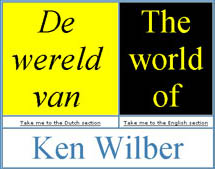
|
Ten years ago, this website started as a fan site to promote the work of Ken Wilber. Actually, I did not start it myself. I discovered it by doing a search for "Ken Wilber" in Altavista – the internet search engine in those days, in popularity comparable to Google. Norbert Scheepers, a psychiatrist and Wilber fan living in Amsterdam, had posted a couple of web pages on Wilber on his private website. It consisted of quotes, book covers and some reviews. When I started to contribute essays to this website, Norbert kindly suggested I took over the web hosting of his website myself. Which I gladly did, for after another decade of book publishing, I had just discovered the Internet. And Wilber was a subject which, as they say these days, had "content". That year, I also started writing the Dutch edition of Ken Wilber: Thought as Passion. My intention was to give a large-scale web presence to Wilber and his work, and provide a forum for discussion on the many topics he has covered.
Almost from the very start "The World of Ken Wilber", as the site was called in those days, started to attract authors who submitted essays. There was clearly a need for critical reflection on Ken Wilber's work. All of them were initially impressed by Ken Wilber's writings, but felt the need to comment on what they saw as deficiencies, and to suggest areas of improvement. A virtual Wilber debate had started. In those early days I posted "A Way Out For Wilberians" written by John Heron (much to his annoyance!), and I received contributions from Gerry Goddard, who tried to reconcile Wilber and Grof in "Airing Our Transpersonal Differences". And I posted my own "Transpersonal Psychology at a Crossroads", arguing the depth psychology should be replaced by height psychology as a framework for transpersonal studies.
Around 1999, other authors started sending in material. Peter Collins had been an active critic of Wilber in the Shambhala forums, and I invited him to summarize his position in a single essay: "The Dynamics of Development". Wilber asked me to post his discussion with Alan Combs, author of The Radiance of Being, on my website (now taken offline at Combs' request). And Mark Edwards was to become the most active contributor of theoretical essays on Wilber, writing whole series of essays ("Through AQAL Eyes" and "The Depth of the Exteriors") on quadrants, perspectives and exteriors and what not.
In 2000 I posted some essays by Don Beck, the co-founder of Spiral Dynamics, of which "Stages of Social Development" is still in the top 10 (see Appendix below). Ray Harris and Andy Smith appeared on the scene as well, both were to contribute some 30 essays on Wilber's work. Harris has remained an active contributor until today; his first essays dealt with the Gulf War, Islam, the Middle East and integral politics. His essay "Christianity: The Great Lie" is a hit. Andy Smith has stopped writing for Integral World only one year ago, but has been an continuous and consistent Wilber critic over the years, summarizing his views in "Why It Matters: Further Monologues with Ken Wilber" – the subtitle of which captured the situation of most Wilber critics quite well, then and now – and "God is Not in the Quad: A Summary of My Challenge to Wilber". He also was one of the first to endorse Jeff Meyerhoffs work, which he reviewed in the aptly titled essay "Contextualizing Ken".
In 2001 I posted, at Wilber's request, Fred Kofman's essay on "Holons, Heaps and Artifacts", which turned out to be the beginning (not the end!) of the "holon debates" on Integral World. Both Mark Edwards and Andy Smith conentrated on Kofman's (and Wilber's) particular take on holons, and found ways of their own to reconceptualize this material.
In the year 2002 and after the aforementioned authors contributed freely and regularly to the Reading Room of Integral World, in the hope of stimulating critical reflection on Wilber's theoretical proposals.
In 2003 the English edition of my book on Wilber called Ken Wilber: Thought as Passion, was published (SUNY Press), attracting more and more visitors to this site. In Wilber's foreword to this book, he wrote:
"I myself have some friendly disagreements with Frank about many of these topics, but I always learn something important from him in our exchanges, and I believe you will, too."
But slowly, the tide turned. Disagreements weren't getting so friendly anymore.
In 2004 Wilber asked me to post a "warning" on this website, called "A Suggestion for Reading the Criticisms of My Work on Frank Visser's "The World of Ken Wilber" Website", in which he suggested that only critics who were in personal contact with him could be trusted. Needless to say, that post generated a lot of response from Integral World authors. Clearly, the nature and conditions for a true Wilber debate were at stake. Ray Harris commented that a public debate isn't possible on the conditions set by Wilber, and Mark Edwards replied that a critical reflection on Wilber's ideas cannot be separated from the development of one's own ideas - which was what Wilber had suggested the critics to do. Edward Berge joined the discussion by raising the pertinent question: "Who Decides What Wilber Means?". In this most insightful essay, he reminded Wilber, tactically quoting from his own writings, that "Artists are not always the best interpreters of their own works." He concluded:
"This essay suggests that while Wilber's – and his inner hermeneutic circle's – interpretations of his work are absolutely necessary in this endeavor, they are not enough. The other contexts above, including Edwards' and Harris' contributions, must be included and considered equally constitutive of Wilber's meaning."
However, within a few months, Wilber urged me to change the name of the website, for he no longer felt it represented his work. I opted for "Integral World", to have both the focus on things integral and on the widest possible range of applications.
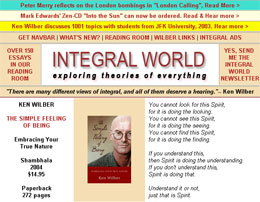
|
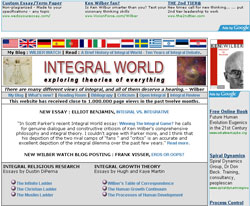
|
|
|
Retrieved from The Wayback Machine. |
Current Integral World website, June 2007. |
In 2005, I started publishing Bald Ambition by Jeff Meyerhoff, an independent scholar who had written a book-lenght review of Sex, Ecology, Spirituality, that went beyond the standard reviews by actually going back to the sources Wilber had used and interpreted, and suggesting a different interpretation. I have supported this rare initiative because, in my opinion, and to put it mildly, the integral field could use some dialectic. Meyerhoff covered Wilber's views on holon theory, individual development, vision-logic, Mysticism, Postmodernism, and others. In later years, Meyerhoff has entered into debates with Mark Edwards and with Ken Wilber himself, though in the latter case, again in virtual form. The title of one of Meyerhoff's later essays, "Dismissal vs. Debate", somehow says it all. It captures the spirit of the way Wilber has approached most, if not all, of the criticisms found on Integral World. With contempt.
In the fateful year of 2006 Wilber posted his infamous Wyatt Earp blogs, primarily directed against this website and its authors – one close integral friend observed it was "Gunfight at the 'I am OK, you are not OK' Corrall", giving a psychological twist to the well-known Wild West theme, symbolizing the struggle between law-and-order and open-banditry. I defended the existence of Integral World and its authors in three personal replies, the first one being "Games Pandits Play", followed by "Not So Fast, Cowboy" and "For the Record". It was as if Wilber had extended his motto "Everybody is right" to "... especially me, and with the exception of my critics, who are always wrong." Framing the controversy, as Wilber did, as one between retarded critics "who hate me" and those who "get" it, was in the end, basically, nothing more then a way to avoid and end debate. Meyerhoff commented in "Dismissal vs. Debate":
Well, the whole thing is a sorry performance, more representative of a disturbed adolescent than the "Einstein of Consciousness."... Wilber is a bizarre mix of imaginative theoretical chutzpah, an astonishingly broad range of intellectual interests and knowledge, mystical insight, audacious and embarrassing self-promotion, inflated self-regard, and a deep insecurity and defensiveness which leads to the cruel acting out which we've seen yet another example of in his audio reply to me.
Those events also triggered the question if Integral Institute was turning into a cult, as Geoffrey Falk argued in his "Pandits and Prisoners", in response to Elliot Benjamin's "On Ken Wilber's Integral Institute". However, more important then this question – the answer depends very much on one's definition of "cult" – was the question: is a free and unrestricted debate on Wilber's work possible within Wilber's sphere of influence – in the spirit of Habermas' "communication free from domination" and "friendly and open-minded interchange"? In my experience, this was not the case. The formation of Integral Institute, and it's many online offshoots, has created a culture that is bent on entertainment, the promotion and application of Wilber's ideas, but rarely, if at all, on fundamental debate.
Integral World thus felt very much like a disowned part of the Integral psyche. Too often have I encountered the complaint that critics on Integral World have misrepresented Wilber's position, so their writings can be dismissed. Could Wilber perhaps have misrepresented the position of others in his many writings? Is Darwin or Derrida a case in point? What about the case for post-formal stages of developement? Does anybody care out there? Was Wilber ever in direct contact with the many authors, past and present, which he has freely criticized? Of course not. That's not how it goes in the real world of public debate. Integral World's focus will therefore increasingly turn to examining Wilber's treatment of other thinkers. As, incidentally, is business-as-usual in science and philosophy.
Needless to say, that controversy also brought a lot of new visitors to Integral World. And more authors joined. Roland Benedikter, author of works on Post-Materialism, submitted five long essays on postmodern spirituality, an edited version of which will be published offline. Alan Kazlev came up with a complete book manuscript: Towards A Larger View of Integral (later to be followed by Integral Esoterism, which was published on Integral World as well). And Elliot Benjamin offered his own musings on integral philosophy the latest one humorously called "Integral With a Twist". That year, I also started blogging – better late then never – in the form of the "Wilber Watch" blog directly connected to Integral World. And the blog Open Integral was founded, to preserve the spirit of free inquiry and debate on matters related to Wilber and the larger field of integral philosphy (Edward Berge, Ray Harris, Andy Smith, Alan Kazlev and others playing an active role in the past year).
The current year of 2007 saw again a handful of new authors: Dustin DiPerna agreed to prepublish some chapters of his book on Integral Religious Research, The Infinite Ladder, of which we have now published "The Infinite Ladder", "The Christian Ladder" and "The Muslim Ladder". Hugh Martin started his original reworkings of Wilber's views on human growth, of which there are now three installments as well: "Wilber's Famous Tables", "The Human Growth Continuum" and "The Processes of Human Development". DiPerna and Martin use Wilber's material in a constructive way – they cannot be called "Wilber critics", but they refine and elaborate on Wilber's writings, another area Integral World supports. Another noteworthy new author on Integral World is Gregory Desilet, who has questioned Wilber's understanding and treatment of postmodernism in "Misunderstanding Derrida" and "Derrida and Nonduality". More essays on postmodernism will follow.
Over the years I have also supported critical work on Ken Wilber which was published elsewhere. Most notably, Geoffrey Falk represented a Wilber critic who covered those fields of science (Bohmian physics, evolutionary theory, parapsychology, meditation research, cultic studies) generally left untouched by other critics. His ebook on Wilber "Norman Einstein" is required reading for any aspiring Wilber fan. Falk, in turn, followed in the footsteps of David Lane, again a former Wilber-fan-turned-critic, who pointed out ten years ago Wilber's misrepresentation of neo-Darwinism, to which he recently returned in an essay for Integral World: "Wilber on Evolution Revisited". We intend to publish more on this topic of evolution shortly, since it touches on the science versus religion controversy, as well as on Wilber's (mis)treatment of science. If Integral World critics are already a bridge too far for Wilber, Falk and Lane are, unfortunately, not even on his radar.
Am I stil a big fan of Wilber, as he himself once suggested? It depends. Only a normal, decent exchange of arguments will do. Perhaps, if he takes his responsibility as intellectual and clarifies his position on topics currently hotly debated in society, such as Iraq, Intelligent Design, Global Warming and the like, instead of dealing with these areas in occasional pay-site video sessions, blogs, footnotes, or worse, trilogies of adolescent prose. That just will not do it for me. Not any more. Some have commented that criticizing Wilber for all those years is somehow a personal thing. Why can't I shut up, leave Wilber alone, and develop my own model? That, I think, misses the point of criticism in science and philosophy. It is the life blood of these enterprises. Does Wilber need critics? Nobody in his right mind can do without them.
APPENDIX: INTERNET PUBLISHING
Internet publishing has made the successs of Integral World possible. For example, in the offline world it would not have been possible to publish these essays to reach readers in 200 countries – in the online world it is. In the network economy, the costs of production and distribution have dropped to almost zero. Now an author can spend hours or even weeks on a 30-page essay, mail it to Integral World, and have it posted overnight, so interested readers all over the world can access it. I am sure this lowering of the publishing threshold has even stimulated the creativity and productivity of these authors. Nothing is more inspiring for an author if he knows somebody on this planet is actually reading his stuff. And since the niche market of Wilber Critique is (still) too small to make printed books a feasible project, internet publishing has filled that gap.
Integral World has received close to 1.000.000 pages views in the past 12 months. This year 2007 will certainly top that, as the following graph shows. It looks like Integral World has entered it's second life cycle. The first peaked in 2003, when my Ken Wilber: Thought as Passion was released in the US (SUNY Press), but then the momentum seemed gone. At the end of 2005, I decided to start an ad campaign on Google for Integral World, and a few months later added Google Ads on the site itself. This gradually attracted more and more visitors to the site. Of course, Wilber's blog postings of mid-2006 stirred up the controversy, and in that sense, there's nothing to attract attention like a good scandal!

Thanks to Google technology, I can publish a weekly top 50 of essays on the homepage. But which were the top ten essays which attracted the largest number of visitors in the past twelve months. As you can see, most were of recent date, but two of them are quite old - real oldies! (Unfortunately, I don't have data of the period before May 2006.)
- Edwards, The Depth of the Exteriors, Part II (2004)
- Visser, The Wild West Wilber Report (2006)
- Harris, Christianity: The Great Lie (2006)
- Visser, Games Pandits Play: 1st Reply to Wilber (2006)
- Beck, Stages of Social Development (2000)
- Wilber, Wilber's statements about his health (2006)
- Edwards, The Integral Cycle of Knowledge (2000)
- Kazlev, The Wilberian paradigm – a fourfold critique (2006)
- Meyerhoff, Six Criticisms of Wilber's Integral Theory (2006)
- Harris, The Myth of Islam as a Religion of Peace (2005)
But the really wonderful thing about the internet, as Chris Anderson has explained in his The Long Tail (2006), is that even essays that never show up in these charts, eventually find their readers. There's a "long tail" of Wilber essays to be found on this website. Here's the long tail as it appears on Integral World. Even the essay on #200 was viewed 50 times in the past twelve months:
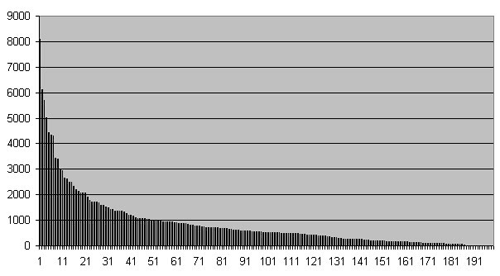
May 2007.